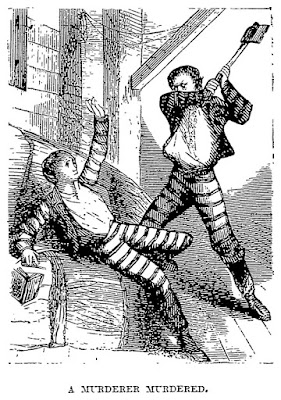Read the full story here: Insane Jealousy
Saturday, July 29, 2023
Anna Wheeler's Killer.
Saturday, July 22, 2023
"With My Knife I Cut Her Throat."
Jesse Pomeroy was 14 years old in 1874 when he stabbed and killed 10-year-old Katie Curran in South Boston. Less than a month later he stabbed and mutilated 4-year-old Horace Millen. Prior to the murders, Jesse had been sentenced to the reformatory for torturing and sexually abusing several other children but was released on probation. After conviction for murder, Jesse Pomeroy would spend his next 53 years in prison.
Read the full story here: Jesse Pomeroy - "Boston Boy Fiend."
Saturday, July 15, 2023
A Rejected Suitor.
Erving’s only flaw was that he was quick to anger and would act out of passion. This was a problem when Erving became infatuated with Dr. Johnson’s daughter, Jane, a highly educated and refined young lady. He repeatedly asked her to marry him and each time she told him, in no uncertain terms, that she was not interested. The family, too, discouraged any notion of a courtship between Erving and Jane. Each rejection increased Erving’s anger.
Saturday, July 8, 2023
A Murderer Murdered.
Read the full story here: The Walton-Matthews Tragedy.
Saturday, July 1, 2023
The Schoonmaker Tragedy.
“No more happy and loving couple could be found,” said Harry’s father, Col. John B. Schoonmaker, “So far as I knew, they never had a quarrel, and all was love and happiness.”
But in December 1888, Harry began acting strangely. His parents noticed he was irritable, and his talk was flighty. Others said he was “…alternately excited and depressed as if he was addicted to the use of opium or some other drug.”












.jpg)










